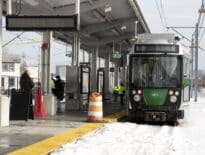The request for proposals process run by the Massachusetts Department of Transportation for parcel 25 in Boston’s Chinatown neighborhood is a sorry example of outdated, unaccountable government that can’t be repeated.
By some measures, MassDOT’s board made a good choice it picked a partnership between two Black-owned firms, Peebles Corp. and Genesis Cos., to develop a parcel of leftover Big Dig land next to Chinatown. The proposed 20-story tower will bring 218 housing units, 40 percent of them income-restricted, to an area desperately in need of them.
The department did the public a good turn, as well, in setting aggressive minority participation goals for every development team bidding on the RFP along the lines of the successful “Massport model.”
But it’s quite possible the outcome could have been far worse. In public engagement sessions MassDOT held as it was developing the parcel 25 RFP, the agency repeatedly promised in presentation slides it provided to Banker & Tradesman that “bidders will be encouraged to maximize affordable housing.” Yet, the final RFP made a housing element entirely optional, with one team, led by BioMed Realty, proposing no housing at all. To add insult to injury, bid documents kept secret from the public, save a brief summary of the proposals that was provided to journalists.
In a neighborhood on the front lines of gentrification and displacement for decades, this is inexcusable. It smacks of the same discredited, high-handed “urban renewal” mindset that the Boston Redevelopment Authority once brought to projects in the city, from the West End and Scollay Square to Roxbury. With land so scarce in Chinatown, any public asset in the area should be used to maximize housing opportunities to keep this historic community stable.
Yet, without a public comment process, there was no way neighborhood groups or other interested parties could communicate the urgency of the situation to MassDOT. A joint letter to this effect, sent by a coalition of prominent Chinatown community groups to MassDOT, Gov. Charlie Baker and other top officials on Feb. 23, 2021 shortly after the RFP was released, apparently made little impact, showing the damage a lack of public comment can have.
What’s worse is that other publicly-owned land mere blocks away has been disposed of through competitive, transparent RFPs for years by a reformed ex-BRA, now the Boston Planning & Development Agency. MassDOT has claimed in the past its policy of secrecy helps the agency get the best competitive proposal, but the city of Boston’s RFP process for the Winthrop Center site show just how empty an excuse that really is. Winthrop Center, as originally approved, generated $151 million in affordable housing funds and other payments from developer Millennium Partners to the city – far more than competing proposals for the site – thanks to the tough, public competition for the city-owned land.
Massachusetts has a long and troubling history of secretive government by unaccountable officials. With the rest of the state already trying to move into the 21st century, Gov. Charlie Baker and his successor need to make sure MassDOT doesn’t stay stuck in the past.
Letters to the editor of 300 words or less may be submitted via email at editorial@thewarrengroup.com with the subject line “Letter to the Editor,” or mailed to the offices of The Warren Group. Submission is not a guarantee of publication.






